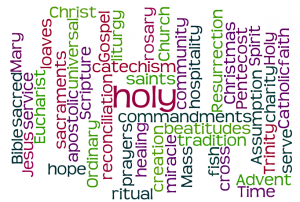“Catholic Identity” is a phrase that both adults and young people struggle to define. We hope this post will provide greater clarity as your family define’s its Catholic identity and how that identity is put into practice.
Each of us has an identity that is made up of a variety of factors: the communities and people we care about, where we grew up (and how we feel about it), where we went to school (and how we feel about it), things we believe, things we enjoy and don’t enjoy, how are family is made up, how we make decisions and so much more. Identity is our distinguishing characteristics; these characteristics form who we are as people and shape the choices we make. If we make the decision to take our faith seriously, over time our faith will become an integral part of who we are and will influence our worldview and our choices.
Catholic faith identity is comprised by the things we believe and do as Catholics. In our reflections the youth have voiced aspects of Catholic identity that are most important to them such as:
- We are always willing to do good – we are called to service and charity

- We believe in one God who is always with us so we are never alone
- Prayer with family and prayer alone (ex: the Rosary)
- Mass (yes, Mass!)
Most importantly, the youth identified the people who are had shared these important practices and beliefs with them as their parents! That’s right! You formed them through your modeling and conversations with them that they were able to identify these aspects of their faith identity as being valuable.
Take some time this week to speak with your young adolescent about what you value as part of your Catholic identity. This may be a belief (that Jesus lived, was crucified, and resurrected from the dead), a prayer, an idea (ex: Catholic Social Teaching), a tradition or ritual (attending Sunday Mass as a family) or a person (ex: the priest who taught me most about my faith was…). Stories about your own family’s faith traditions also provide a powerful witness to your teen. Tell stories about their baptism, what you remember about their first communion, your family traditions at the holidays, etc. They don’t only want to know why the universal Church expresses its faith as it does, they want to know why you express your faith the ways that you do.
If there is something about our faith you would like to know more about consider looking at the United States Council of Catholic Bishops website which has a variety of helpful resources on what we believe, on the teachings of our Church, on the different prayers that we use. This may be an excellent website to explore together with your youth. You can also refer to the Catechism of the Catholic Church, a collection of our beliefs and teachings. This document is also available in a youth-friendly format.
Remember, the youth are not the church of the future only; they are also (and more importantly) the church of today. In the same way that you wouldn’t wait until your child was a teenager to expose them to sports, don’t wait to welcome them into your faith by praying with them, talking with them, and practicing with them.
